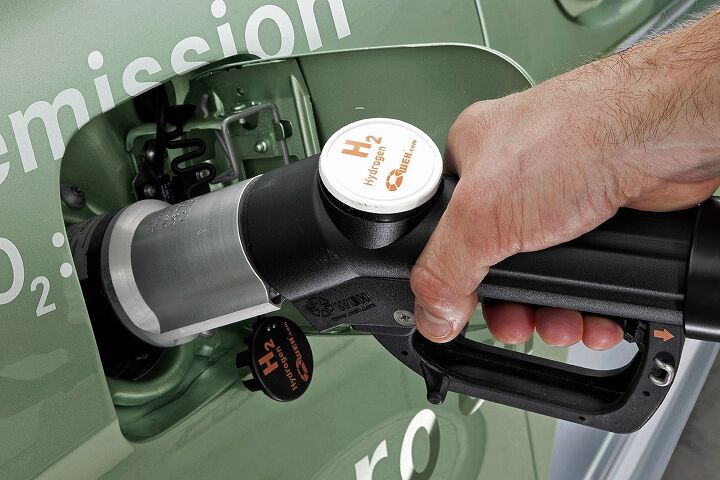Further Proof That Hydrogen Cars Are Stupid

Hydrogen is the most abundant element in our universe and hydrogen-powered vehicles produce only a single emission: water. It’s no wonder a handful automakers have touted it as the next-step in “sustainable” transportation, because it looks great upon a cursory examination. But it hasn’t held up under increased scrutiny and numerous manufacturers have been highly critical of fuel cell cars.
Earlier this year, Jaguar Land Rover’s technical design director called hydrogen-powered vehicles a disaster in practical efficiency. Tesla Motors’ Elon Musk went even further, calling the technology “incredibly dumb.” More recently, VW Group also hinted that it thought there wasn’t going to be much of a future for fuel cells. Matthias Mueller’s address at the Frankfurt Auto Show was heavy on electrification and light on hydrogen, with Audi spearheading the technology.
Although, if president of Audi of America Scott Keogh is to be believed, it looks to be a rather dull spear they are using.
“The worst thing you can do is kind of half bake electric, then go off on another science project with fuel cells, then go running to another science project,” Keogh told Automotive News at the show.
Post dieselgate, Volkswagen Group has billions wrapped up in developing electric vehicles, using its Electrify America subsidiary to improve the EV infrastructure in the United States, and collaborating with other automakers to do the same in Europe.
After, and only after, VW has established itself as an electrified dynamo will it bother pursing hydrogen fuel cells with any earnestness. Keogh estimated that Audi would have “limited fleets” of hydrogen-powered test vehicles on the road within five years and would consider vehicles for consumer use sometime after that.
However, Toyota, Hyundai, and Honda are pursing hydrogen as a potentially viable energy source while other automakers are snubbing it. So what’s the problem?
Jaguar Land Rover’s technical design director Wolfgang Ziebart described the issue as one of practical efficiency. Hydrogen-powered cars are not yet a green solution and extracting their energy source, abundant as it may be, requires quite a bit of energy. The processed hydrogen is then stored, shipped, and consumed by vehicles that are electrically driven.
“You end up with a well to wheel efficiency of roughly 30 percent for hydrogen, as opposed to more or less well to wheel 70 percent efficiency for a battery electric vehicle,” explained Ziebart. “So the efficiency of putting the electric energy directly into a battery is about twice as high as the efficiency of producing and using hydrogen.”
“If there was a strong reason to have a hydrogen infrastructure, then I think it would be set up, but with this disastrous well-to-wheel relationship, it doesn’t just make sense,” he concluded.
Musk would agree. He has condemned hydrogen fuel cell technology as wasteful in the past, going so far as to suggest other gasses would be easier to live with. “If you’re going to pick an energy storage mechanism, hydrogen is an incredibly dumb one to pick — you should just pick methane, that’s much much easier, or propane,” he said.
With a vested interest in battery-electric vehicles, Musk would obviously prefer drivers get their car’s energy via wires. But, he seems particularly uncharitable toward a hydrogen-based alternative. As compressible gasses go, he says it’s just about the worst one.
There also isn’t much of an infrastructure for hydrogen fueling outside of Pacific Asia. While some areas of Europe and the United States (California, mainly) have small pockets of them, they don’t extend beyond urban centers. That would make it impossible for any hydrogen-powered vehicle to leave the confines of their home territory. Meanwhile, electric charging stations are cropping up everywhere and a carefully plotted course means a BEV would eventually make it across the entire continent.
The only advantage the hydrogen car would have is the time it takes to “refuel.” While a battery-powered car needs hours upon hours to recharge via a standard outlet, even a fast charging station could leave you immobilized for over an hour. Comparatively, gassing up your ride with hydrogen would only take a few minutes to achieve the same range. But you’re not going to find any H-Stations on a road trip and the gas doesn’t come trickling out of the walls of every home that paid its gas bill that month.
Audi says, even after it starts dabbling with hydrogen-powered test vehicles, it won’t be pursuing Honda or Toyota’s plans to help establish an infrastructure to fuel them. It’s far more interested in backing VW Group’s battery-powered cars.
“Every time another manufacturer starts to lean more on EVs and throw more resources at them, it pushes the momentum more towards that solution,” explained Karl Brauer, executive publisher of Autotrader and Kelley Blue Book.
Mercedes-Benz, General Motors, and Hyundai have all scaled down their hydrogen-fueled dreams of late. Chevrolet’s Bolt has proven GM knows what its doing with electrification and Mercedes-Benz has promised a slew of mild-hybrids in the years to come. Hyundai, which looked poised to follow Toyota and Honda, may have developed the Tucson Fuel Cell — but has stated it will be gradually abandoning the technology to focus on battery power.
[Image: Daimler AG]

A staunch consumer advocate tracking industry trends and regulation. Before joining TTAC, Matt spent a decade working for marketing and research firms based in NYC. Clients included several of the world’s largest automakers, global tire brands, and aftermarket part suppliers. Dissatisfied with the corporate world and resentful of having to wear suits everyday, he pivoted to writing about cars. Since then, that man has become an ardent supporter of the right-to-repair movement, been interviewed on the auto industry by national radio broadcasts, driven more rental cars than anyone ever should, participated in amateur rallying events, and received the requisite minimum training as sanctioned by the SCCA. Handy with a wrench, Matt grew up surrounded by Detroit auto workers and managed to get a pizza delivery job before he was legally eligible. He later found himself driving box trucks through Manhattan, guaranteeing future sympathy for actual truckers. He continues to conduct research pertaining to the automotive sector as an independent contractor and has since moved back to his native Michigan, closer to where the cars are born. A contrarian, Matt claims to prefer understeer — stating that front and all-wheel drive vehicles cater best to his driving style.
More by Matt Posky
Latest Car Reviews
Read moreLatest Product Reviews
Read moreRecent Comments
- Bd2 Would be sweet on a Telluride.
- Luke42 When will they release a Gladiator 4xe?I don’t care what color it is, but I do care about being able to plug it in.
- Bd2 As I have posited here numerous times; the Hyundai Pony Coupe of 1974 was the most influential sports and, later on, supercar template. This Toyota is a prime example of Hyundai's primal influence upon the design industry. Just look at the years, 1976 > 1974, so the numbers bear Hyundai out and this Toyota is the copy.
- MaintenanceCosts Two of my four cars currently have tires that have remaining tread life but 2017 date codes. Time for a tire-stravaganza pretty soon.
- Lorenzo I'd actually buy another Ford, if they'd bring back the butternut-squash color. Well, they actually called it sea foam green, but some cars had more green than others, and my 1968 Mercury Montego MX was one of the more-yellow, less-green models. The police always wrote 'yellow' on the ticket.


































Comments
Join the conversation
The only way I can see using hydrogen as a fuel is if it is used AS a fuel, not converted into some other form. Every conversion uses--wastes--energy that could have been used in a more direct means. Hydrogen can be burned, and burning itself would be more efficient than feeding into a fuel cell. But the greatest waste is in cracking the hydrogen in the first place, using as much or more electricity than feeding said electricity into a battery first. You want hydrogen? Get it raw, don't pull it from hydrocarbons which would release other toxic gasses into the air. You want to burn a hydrocarbon, then burn it in a centralized location where the emissions can be properly trapped and treated and use the electricity generated from such to power vehicles. That serves the purpose of making the pollution more remote AND makes the whole process more efficient than burning them in hundreds of millions of vehicles every day.
Ye cannae change the laws of thermodynamics, Jim. - Scotty It takes a lot of energy to liberate hydrogen from water, methane, methanol, whatever. You also have to make it at 99.9999% purity because any contaminants could poison the fuel cell catalyst, which at the moment is platinum. Platinum isn't cheap or plentiful, and you need a lot more for a PEM fuel cell than you need in a catalytic converter. Hydrogen is the lightest, least dense element in the universe. Unless you want every fuel cell vehicle towing a Hindenberg size gas bag behind it, you have to compress the gas. A lot. To get hydrogen compressed to a density that makes sense (around 10,000 psi) takes 30% of the energy that the hydrogen produces in burning it. That's a hell of a penalty, even if you use it in a modified internal combustion engine, as Ford has done. To liquefy hydrogen (as BMW has tried) is even more energy intensive, and then you have a cryogenic liquid at -432 F, with constant boil off from a massively insulated tank. You can vent the hydrogen gas when you aren't driving, or run it through a fuel cell and help power your house when you're parked. The infrastructure is complex. So unless leprechauns and unicorns can exhale 99.9999% pure H2 @ 10,000 psi, and poop platinum for free, it ain't gonna be viable on a global scale. He's dead, Jim. - Bones